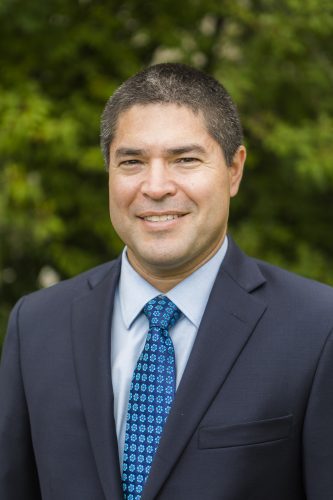Friday Focus: Until there is equity and justice
June 19, 2020

— by Evon Peter, vice chancellor for rural, community and Native education
When my mother moved us from Vashraii K’oo (Arctic Village) into Fairbanks, we lived in low-income housing on 22nd Avenue, off South Cushman. I remember one of the first conversations my mother had with me. It was about being careful with how the police would see me as an Alaska Native male. Even though I am a light-skinned Native, it didn’t matter. This is a conversation that Black and brown mothers have with their children in order to protect them in a racist society.
Later in life my mother shared stories with me about her early years as a child and the extreme racism that my grandfather and grandmother endured.
She remembers having to listen to racist remarks about my grandfather when they would go to a store. She was uncertain if he was even understanding what the people were saying. Gwich’in was his first and primary language; she said he would just smile at the people and move on. My mother also shared her experience of being sent away to an abusive boarding school, the Wrangell Institute, that attempted to strip her of her language, culture, spirituality and identity as a Gwich’in woman.
Ideologies of white supremacy and racism against Black, Indigenous and other people of color are embedded in the psyche of our nation. From the earliest onset of colonialism, the Vatican and European nations sanctioned, in fact indoctrinated, the enslavement of African peoples and the genocide of Indigenous peoples for the exploitation of their labor, land and resources to benefit “white” men.
For centuries, Black and Indigenous people were treated as far less than human, with lynchings and mass murders often celebrated by the white population. To this day, some of the most vicious of rapists and murderers are celebrated within the history books of our schools, some with national holidays named in their honor. Throughout U.S. history, these ideologies and practices have been indoctrinated into our legal, economic, political and education systems. We are raised in a society that projects racism and inequity as “normal.”
The result from generations of inequity and exploitation is extreme disparities in health, wealth, power and access, divided along racial lines. Imagine that for the next 200 years white people were not allowed to own land, own a business or vote, and that 75% of the income from their labor was given to Black and Indigenous people.
It is unthinkable, yet this is essentially the historical treatment of Black and Indigenous peoples in the United States. For hundreds of years, white people have been taught by their families, schools, government and media that they are racially superior. For hundreds of years, the beneficiaries of white privilege have exploited Black, Indigenous and other people of color to advance in education, business and politics.
It is not enough to declare that we are all now equal, because we are not.
As a society we have work to do — as individuals, in our institutions and in government. Those of us with power and privilege have a responsibility to enact antiracist policies and practices. As celebrated author Angela Davis says, “it is not enough to be non-racist, we must be anti-racist.”
It is our responsibility to confront racism and actively work to build equity throughout our society. We cannot afford to avoid the challenging and uncomfortable conversations that must be had in order for us to save lives and bring about lasting change.
Education is a key factor in bringing about systemic change. At UAF, we have instituted a required Alaska Native-themed course for all four-year students. We are working on required training in Alaska Native cultural awareness for all new faculty and staff. We have established a Nanook Diversity and Action Center that is working to keep our campuses free of violence, discrimination and fear of violence. We have initiated diversity and inclusion scholarships, and we co-sponsor the African-American Student Leadership Conference.
And we know that we need to do more. I encourage us all to pursue resources to educate ourselves on the histories that have brought us to where we are today and on how we can be part of confronting racism. For starters, I will recommend and join you in reading “So You Want to Talk About Race,” by Ijeoma Oluo; “White Fragility,” by Robin DiAngelo; and “An Indigenous Peoples’ History of the United States,” by Roxanne Dunbar-Ortiz.
I am proud to be part of a diverse core leadership team at UAF. Our diversity of perspectives and experiences — as African-American (Vice Chancellor for Student Affairs Champagne), East Indian (Provost Prakash), Alaska Native (myself), and more women than men — are critical to successfully leading this university and serving our students. We don’t have all the answers, but we are willing to have challenging conversations as we work to advance a diverse, inclusive, respectful and caring culture at our university. Thank you to all those who have been and are contributing to the vision and work to help move us in this critical direction!
Friday Focus is a column written by a different member of UAF’s leadership team every week. On occasion, a guest writer is asked to contribute a column.


